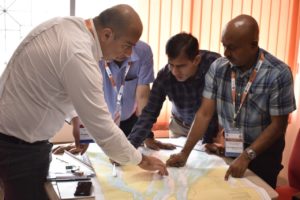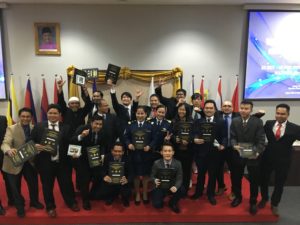
IALA Marine Aids to Navigation training courses (Level 1 and Level 2)
The international character of shipping operations generates the need for a common approach and universally agreed standards for Marine Aids to Navigation (AtoN). According to the SOLAS Convention Chapter V, Regulation 13, Paragraph 2, “In order to obtain the greatest possible uniformity in Marine Aids to Navigation, Contracting Governments undertake to take into account the international recommendations and guidelines when establishing such aids.” Reference is made within the footnote to the Regulation to IALA Recommendations and Guidelines.
The successful delivery of AtoN services depends upon competent and experienced personnel to implement and maintain such aids. It means that IALA should not only define international standards for the AtoN themselves, but also for the personnel in charge of their implementation and their maintenance.
The recruitment, selection and training of suitable personnel are pre-requisites to the provision of professionally qualified personnel capable of contributing to safe and efficient AtoN operations.
The IALA Level 1 Marine Aids to Navigation Manager series of model courses provides a framework for the training and education of professionals involved in the strategic and operational management of AtoN services. The model courses cover the fundamental principles of effective AtoN management, with a significant emphasis on the implementation of the IALA standards, to enable coastal States to have suitably qualified professionals to effectively discharge their obligations under the SOLAS Convention.
The IALA Level 2 Marine Aids to Navigation Technician series of model courses provides a framework for the training and education of personnel tasked with conducting the installation, servicing, maintenance or replacement of marine aids to navigation and their components.

IALA Vessel Traffic Service training courses (V-103 series)
A major factor in the effective delivery of a Vessel Traffic Service (VTS) is the competence and experience of its personnel to:
- provide timely and relevant information on factors that may influence the transit of a ship and to assist on-board decision making;
- monitor and manage traffic to ensure the safety and efficiency of ship movements; and
- respond to developing unsafe situations to assist the on-board decision-making process.
Training and certification for VTS personnel is recognised internationally through the following framework within IMO Resolution A.857(20) on Guidelines for Vessel Traffic Services. The Resolution states, inter-alia, that the Contracting Government or Governments or the competent authority should ensure that the VTS authority is provided with sufficient staff, appropriately qualified, suitably trained and capable of performing the tasks required and ensure that provisions for the training of VTS operators are available.
IALA Recommendation R0103 on the training and certification of VTS personnel states that competent authorities and VTS authorities implement and establish VTS training and certification in a standardised and harmonised manner in accordance with the guidelines and model courses developed by IALA.
The IALA VTS V-103 model courses are delivered by a global network of accredited training organisations.

English language ability for IALA model courses
For courses delivered in English, it is expected that participants should have attained the International English Language Testing System (IELTS Band 5 or equivalent) prior to commencing the course to maximise the learning experience and to facilitate full participation:
“You have a partial command of the language, and cope with overall meaning in most situations, although you are likely to make many mistakes. You should be able to handle basic communication in your own field”.
